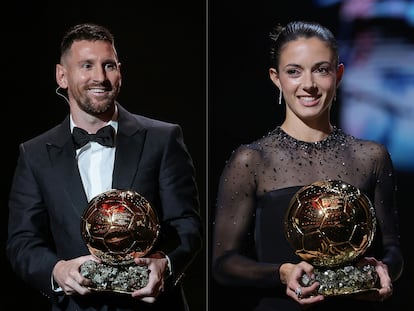Ballon d’Or: Aitana Bonmatí and Leo Messi land best player awards in Paris
The awards for the Spain and Argentina World Cup-winners are vindication of Barcelona’s La Masía ethos and the club’s commitment to its women’s team

From Lusail to Sydney. The World Cup in Qatar last winter, and the World Cup in Australia and New Zealand this summer, have brought two total footballers to the forefront, the driving forces behind their respective teams, and with more in common than it may seem. Two footballers trained in La Masía, the FC Barcelona academy, where Cruyffist tradition is instilled and the balletic soccer that Aitana Bonmatí performs with the ball at her feet, whether for Barça or Spain, is learned. La Masía is a quarry that placed its faith in talent when many others prioritized physicality; where they carefully nurtured for the young Lionel until he became Leo Messi, lord and master of the field, finally anointed a World Cup-winner with Argentina in Qatar.
A player who enamored Camp Nou and worked tirelessly to adapt his childhood rodeo style of soccer until he had molded it to the Barça style, Messi is a peerlessly skillful player who at the World Cup, aged 35, rose to the challenge of taking on the mantle of undisputed leader for a new generation who scarcely dreamed of one day sharing a locker room with their idol.
Bonmatí, now a world champion and the Golden Ball winner at the World Cup in Australia and New Zealand, as well as lifting the Champions League trophy with Barça, was awarded her first Ballon d’Or on Monday, a legacy of both Spain and Barça that her teammate Alexia Putellas has led charismatically, earning her the two previous Ballons d’Or and the distinction of becoming the first Spanish player to win the coveted trophy.
Messi, who was also named the player of the tournament in Qatar, added his eighth Ballon d’Or to an unparalleled collection. The latest addition carried special value for having been awarded as a result of long sought-after success with his national team, which lives for Messi and because of Messi, and not at club level. His seven previous Ballons d’Or came via Barcelona’s domestic and European dominance, when Messi shone surrounded by an exceptional generation of players. Camp Nou has also been rewarded for its decision to raise the profile of its women’s team, astutely realizing that doing so is not investing at a loss. On Monday, Barcelona Femení won the award for the best team of the year.

With Bonmatí's recognition in Paris, the last three Ballons d’Or have been won by Spanish players representing Barcelona. It is no coincidence. The club hierarchy made the decision to challenge the hegemony of French powerhouse Olympique Lyon and understood that to do so it had to invest, assume some initial losses, allocate staff to generate media attention and a presence on social networks, sell the product, and open the Camp Nou. And it paid dividends when 91,600 fans packed the stadium for a Champions League game against Wolfsburg, a month after 91,553 people turned out to watch the Clásico against Real Madrid Femenino.
Barça understood how to tap the success of a team that had the best player in the world in its ranks: Alexia. And next to her, a little smaller, with the same grace on the ball, was Aitana. Today, she is the best player in the world. “I’m lucky to be able to play for a great club and the national team. I have the best players and staff by my side. We reached the Champions League final for three years in a row and it speaks volumes about our mentality. In Spain there is a lot of talent, we are a country that lives soccer and we work to be the best,” she said as she took the stage in Paris.
The success of Spanish players, thanks to the initial push of Barcelona — which invested more than anyone domestically and believed in its project like few others — coincides with a period of vindication in the women’s game. The triumph of the national team in Sydney, winning over the audience and projecting its victory despite all the odds, allowed the players to use the loudspeaker that their soccer and their newly acquired fame had given them. Their demands have translated into significant improvements: they have renewed the collected bargaining agreement with Spain’s top division, Liga F, and managed to raise the minimum wage from €16,000 to €21,000 ($22,367) per year, with another increase to €23,500 ($25,040) in two years); the minimum wage for male footballers in Spain is €182,000 ($194,392). They have also achieved greater standing within the Spanish Football Federation and are negotiating structural changes and significant improvements to protect female footballers and defend the right to maternity, among other measures to professionalize women’s soccer in Spain.
They have achieved much but they will not rest on their laurels. The success of players like Aitana, a symbol of a generation that was trained in schools, who learned their craft in girls’ teams and not mixed with boys, and who climbed the ladder with a naturalness their predecessors could never have imagined, prove that well-taken opportunities translate into results. We are witnessing this victory for a third consecutive year. We have also witnessed confirmation that raw talent can reach unthinkable heights when the investment of clubs, institutions, and sports federations turn it into a ballet soccer at dance schools like La Masía, via gifted students like Aitana and Leo.
Therefore, a paradigm shift is needed in the belief that women will be able to generate as much as men (or nearly as much) when they compete on equal terms.
FIFA Ballon d’Or awards 2023
Kopa (best young player). Jude Bellingham.
Socrates (social work). Vinicius Jr.
Women's team. FC Barcelona
Yashin (best goalkeeper). Emiliano Martínez.
Gerd Müller (best forward). Erling Haaland
Men's team. Manchester City
Women's Ballon d'Or. Aitana Bonmatí
Men's Ballon d'Or. Lionel Messi
Sign up for our weekly newsletter to get more English-language news coverage from EL PAÍS USA Edition
Tu suscripción se está usando en otro dispositivo
¿Quieres añadir otro usuario a tu suscripción?
Si continúas leyendo en este dispositivo, no se podrá leer en el otro.
FlechaTu suscripción se está usando en otro dispositivo y solo puedes acceder a EL PAÍS desde un dispositivo a la vez.
Si quieres compartir tu cuenta, cambia tu suscripción a la modalidad Premium, así podrás añadir otro usuario. Cada uno accederá con su propia cuenta de email, lo que os permitirá personalizar vuestra experiencia en EL PAÍS.
¿Tienes una suscripción de empresa? Accede aquí para contratar más cuentas.
En el caso de no saber quién está usando tu cuenta, te recomendamos cambiar tu contraseña aquí.
Si decides continuar compartiendo tu cuenta, este mensaje se mostrará en tu dispositivo y en el de la otra persona que está usando tu cuenta de forma indefinida, afectando a tu experiencia de lectura. Puedes consultar aquí los términos y condiciones de la suscripción digital.









































